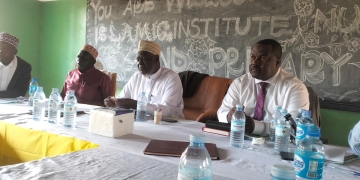KAMPALA-In a phenomenal decision delivered on Friday, October 4, 2024, the Court of Appeal in Uganda v. Kamoga Mohammadi (Criminal Appeal No. 646 of 2023) decisively clarified the relationship between criminal and civil litigation in Uganda.

The panel composed of Justices Egonda-Ntende, Barishaki Cheborion, and Mugenyi, underscored the principle that criminal cases take precedence over civil matters due to their focus on public interest.
This judgment has far-reaching implications for Uganda’s legal landscape, especially for the judicial officers, litigants, and prosecutors involved in cases where both civil and criminal issues arise from the same facts. The decision reinforces the doctrine that criminal matters cannot be stayed merely because civil proceedings are ongoing, absent compelling reasons that directly affect a party’s right to a fair hearing.
This appeal revolved around the High Court’s decision to stay criminal proceedings against Kamoga Mohammadi while civil litigation based on the same facts was still pending. Mohammadi was facing criminal charges, but also had a civil case proceeding from the same set of facts.
The High Court, without an application for a stay of proceedings before the Magistrate’s Court, ordered a stay of the criminal trial in favor of the civil matter thus prompting the Office of the Director of Public Prosecutions (ODPP) to contest this decision, arguing that criminal proceedings should take precedence, even when civil litigation is concurrently ongoing.
The appeal raised fundamental legal questions about the hierarchy and interaction between civil and criminal cases and the scope of the High Court’s supervisory and appellate jurisdiction in such instances.
Key Judgments and Findings:
The Court of Appeal firmly overturned the High Court’s decision, emphasizing several critical points in its judgment, to wit:
The Role of Lower Courts in Stay Applications: The Court of Appeal criticized the High Court for usurping the powers of the Magistrate’s Court by ordering a stay of proceedings when no such application had been made before the magistrate. The appellate court stated unequivocally that the High Court cannot entertain a review or an appeal without an order from the lower court. It ruled that the High Court’s decision to stay the criminal proceedings was improper and outside its jurisdiction.
“By making an order for stay when there was no application for stay before the magistrate’s court, the High Court was usurping the powers of the lower court. The High Court cannot review or entertain an appeal when there is no order from the lower court,” stated the Justices of Appeal.
Criminal Matters as a Public Interest Priority: The court emphasized the fundamental difference between criminal and civil proceedings. Criminal matters, the judgment noted, are offenses against the state and public order, not just private interests between individuals. Given that crimes affect society as a whole, criminal proceedings must take precedence over civil litigation.
The Justices of Appeal remarked, “Criminal cases focus on offenses against the state and public order, while civil cases address disputes between individuals or entities seeking to enforce private interests… It is difficult to discern how private interest litigation can take precedence over public interest litigation.”
This distinction reaffirms a well-established legal principle that criminal proceedings, even when they arise from the same facts as civil matters, cannot be stayed in preference to civil cases unless exceptional circumstances justify such an action.
- Precedent on Criminal Precedence: In the judgment, the appellate court referred to previous cases that had addressed the same issue. In Uganda v. Sonko (Criminal Revision No. 12 of 2019), the High Court had previously held that staying a criminal case in favor of a civil suit was improper and violated the principle that criminal cases have priority over civil matters. The court reaffirmed this principle, that civil and criminal cases serve different purposes and can proceed concurrently. Thus, the criminal prosecution should not be stayed merely because of ongoing civil litigation, unless there are serious grounds affecting a party’s right to a fair hearing.
The DPP’s Authority and Public Interest: Article 120 of Uganda’s Constitution grants the Director of Public Prosecutions (DPP) wide authority to prosecute criminal cases. In exercising this power, the DPP is required to consider the public interest, the administration of justice, and the prevention of abuse of the legal process. The Court of Appeal emphasized that the DPP’s decision to prosecute criminal matters cannot be interfered with lightly.
“The DPP has the authority to initiate, conduct, and discontinue criminal prosecutions without interference. Where a party is aggrieved by the DPP’s decision, there are legal remedies provided… However, to stay criminal proceedings while civil proceedings are continuing is not one of the mechanisms envisaged unless there are exceptional circumstances,” the Court stated.
The court further noted that if a party feels aggrieved by a criminal prosecution, they may seek remedies through defenses during trial or appeals after conviction. Additionally, individuals may file suits under the tort of malicious prosecution. However, staying criminal proceedings pending civil litigation was not among the acceptable legal remedies.
Implications of the Judgment:
Reaffirmation of Criminal Proceedings’ Priority: This judgment serves as a crucial reminder of the priority that criminal matters hold over civil disputes. It reaffirms the principle that offenses against the state, which affect public order, cannot be delayed simply because private civil litigation is ongoing. The judgment bolsters the authority of the DPP and ensures that criminal prosecutions can continue unimpeded by civil proceedings, safeguarding public interest.
Limits on Judicial Intervention:
The Court of Appeal’s decision limits the scope of the High Court’s intervention in lower court proceedings. By insisting that a stay must first be sought from the Magistrate’s Court, the judgment ensures that lower courts retain their authority in such matters, preventing the High Court from bypassing the necessary procedural steps.
Clear Framework for Managing Concurrent Proceedings:The judgment provides clarity on how courts should manage cases where both civil and criminal proceedings arise from the same facts. Rather than staying criminal cases in favor of civil suits, courts must allow both matters to proceed independently, ensuring that justice is served in both public and private interests. This promotes judicial efficiency and discourages delay tactics by litigants seeking to escape criminal accountability by initiating civil suits.
Strengthening the Role of the DPP:The judgment strengthens the DPP’s constitutional mandate and autonomy in prosecuting criminal cases. The judgment protects the DPP’s role in ensuring public justice is prioritized by affirming that criminal prosecutions cannot be stayed in favor of civil matters.
Conclusion:
The Court of Appeal’s judgment in Uganda v. Kamoga Mohammadi (Criminal Appeal No. 646 of 2023) represents a significant reaffirmation of the precedence of criminal over civil proceedings. By overturning the High Court’s decision to stay the criminal trial, the appellate court has sent a clear message: criminal cases are matters of public interest that cannot be postponed simply because of concurrent civil litigation. The decision underscores the importance of procedural justice and the DPP’s autonomous role while reinforcing the constitutional mandate to prioritize criminal prosecutions for the good of society. This momentous decision will likely influence future decisions and solidify the precedence of criminal justice in Uganda.
The matter was handled by Happiness Ainebyona, a Chief State Attorney in the Office of the Director of Public Prosecutions.
The office of the Director Public Prosecutions through its spokesperson, Jacqueline Okui welcomed this decision










